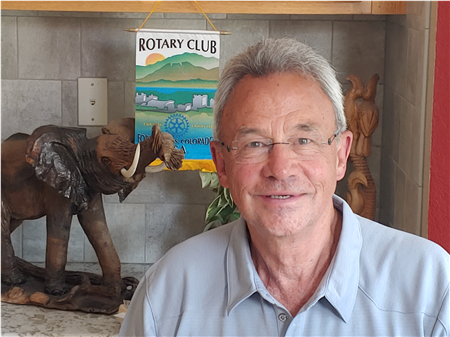
For our meeting on February 1, in a presentation thankfully not challenged by technological issues, club member and past club president Del Benson outlined for us his Diversity, Equity, and Inclusion (DEI) journey through life. He started out with two visual aids: a black and white T-shirt that emphasizes the fact that DEI is not black and white but rather has all the shades of gray; and a preserved cow patty which he received on being awarded his PhD, emphasizing the fact that DEI requires looking at people in all levels of society and all levels and types of economic activity. He then set the tone for the rest of the talk by recalling the World-War-I story of the spontaneous one-evening “armistice” on Christmas eve when all of the soldiers on both sides laid down their arms and celebrated the spirit of the season by fraternizing between the trenches; this was terrible for fighting morale because the men of both sides got to see the face of the enemy.
Del started by pointing out that he is, in some sense, a different person to different people: e.g., professor, grandparent, Rotary Club president, volunteer elf; he has lived a rural life and an urban life, a local life and an international life – and his experience has been that DEI, whether internationally or as local as our club, is good for people and good for the land. He acknowledged that DEI can generate anxiety and fears but asks how intentionally we take the next step – what will we do tomorrow? Can we use civil discourse and sustainable practices to enhance interests and resolve conflicts?
He has had, in some sense, a privileged life, but he suggests that he has earned those privileges, acquiring from an unusual old acquaintance the nickname “Ambi” for “ambassador”. He suggests that people are mostly good everywhere, some more than others and different in detail but similar. Experiences in South Africa and at Auschwitz and his knowledge of slavery perpetrated by both whites and blacks certainly left scars on humanity that we are still working to heal. He then walked us through the puzzle pieces of his life that have resulted in his current intentional, persistent life that is open to learning and not afraid to act.
Del grew up on the southern mountains in a variety of agricultural and small-town situations, in some situations encountering the difficulties of racial strife, in others being insulated from those problems by a more homogeneous population. From the 5th grade, he worked every weekend and every summer with and for his parents, on the ranch and, later, in their small-town gas station. In those years, his exposure to city folk who came there to hunt and Spanish/Hispanic families who did much of the work in the area gave him a wide appreciation of the value and benefit of diversity. He suggests that he learned more from those experiences and from interacting with his school mates than he did from academics at the local school that he attended. Overall, he learned that you had to work hard to become accepted within the local community.
During his senior year, Del won an essay contest about integrating lands, wildlife, and people, resulting in a summer job at the National Wildlife Research Center in Denver where his supervisor was a black PhD mammalian physiologist who introduced him, not only to scientific work, but also to the issues of being black during times of racial unrest. During his first year at CSU, he had a black room mate who had a diversity of interests and who “put on his pants just like the rest of us.” Academically, his education at CSU was multi-disciplinary, ultimately leading to three degrees (wildlife biology, natural resources administration, and outdoor recreation administration).
He ultimately married Jeannie from a family that also lived on a small-scale farm and ranch but whose father was a local water commissioner, from whom Del learned about water rights. Jeannie went to school with 1/3 white, 1/3 Hispanic, 1/3 Navajo and Southern Utes. The Navajos, from Arizona, lived in a boarding school and apparently were not exposed to the boarding-school horrors that periodically make the news.
His first permanent job was in Toronto, Canada, where he not only learned about hockey but also was exposed to the issues associated with the fact that private landowners experienced few benefits from wildlife and tourism on their lands. His long-term mission became to enhance wildlife production and management by the rural population along with ethical consumption by diverse hunters and other non-rural users.
With that background, he came to CSU where he spent the next 46 years on the faculty where he continued to learn and develop the wildlife/human relationship on both public and private land. A Rotary Ambassadorial Fellowship to South Africa spent studying wildlife production and use on private lands where marginal farming and ranching lands were converted to wildlife habitats where individual land owners cooperated to enhance the economic value of the touristic enterprise and the benefit of overall nature conservation – “if it pays, it stays!”. This led to various studies about sustainable tourism, climate change, exotic wildlife on the land, and native conservation in numerous other countries and a long-term academic relationship with predominantly black universities in South Africa. Although all of this resulted from hard work along the way, it was dramatically helped by the early leg up from Rotary.
With all of that as a background, Del asks what we will do with DEI in the future. Don’t forget where you come from but open your heart, eyes, and hands to new ways and people and your feet will follow.